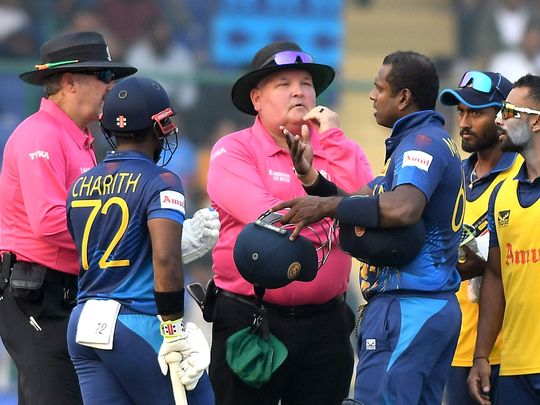
The spirit of cricket is back to haunt us again. The timed-out dismissal of Angelo Mathews resurrected it from the preamble of the Laws of Cricket. It happens whenever there’s an unusual dismissal. Not long ago it was Jonny Bairstow’s stumping in the Ashes series. Before that it was Deepti Sharma’s run out (mankading) of Charlie Dean in an India-England women’s One-Day International.
Now it’s the turn of a timed-out dismissal — a first in international cricket. Which is why Bangladesh captain Shakib Al Hasan has been hauled over the coals for violating the Spirit of Cricket during the Cricket World Cup game against Sri Lanka. He appealed for a timed-out dismissal after Mathews sought a replacement helmet, busting the two-minute limit for resumption.
As per the laws, Mathews was out. Why would the spirit of cricket come into question? That’s because in cricket, there are laws, and then there is the spirit of cricket. Matches are not only played as per the laws (not rules) of the game but also according to its spirit.
What’s the spirit of cricket?
In the late 1990s, England greats Ted Dexter and Colin Cowdrey sought to add Spirit of Cricket to the Marylebone Cricket Club’s Laws of Cricket to ensure fairplay. When the laws were updated in 2000, a Preamble on the Spirit of Cricket reminded players and officials of their responsibility to ensure cricket is played fairly.
“Cricket is a game that owes much of its unique appeal to the fact that it should be played not only within its Laws but also within the Spirit of the Game. Any action which is seen to abuse this spirit causes injury to the game itself,” it said.
The rationale behind the spirit of cricket is fine. But this puts the laws at the mercy of the spirit of the game. A batter has to be out as per the law and shouldn’t violate the spirit of cricket. Tough, isn’t it? Because it’s not always possible.
That puts freakish dismissals under the scanner. Every time a non-striker is run out for backing up, some cricket watchers trash the bowler in the name of the spirit of cricket. An equal number of experts deride the notion of fairplay, arguing that cricket’s no longer a gentleman’s game. But nobody criticises the batter for attempting to cheat by moving out of the bowling crease before the ball is delivered.
If all cricketers played according to the spirit of the game, batters would have walked after edging the ball behind. Adam Gilchrist was the last batter to walk regularly, and it didn’t sit well with some of his Australian teammates. Except for Indian captain G.R. Vishwanath recalling Bob Taylor in the 1980 Golden Jubilee Test in Mumbai, I don’t remember an instance of captains calling back batters who were ruled out despite not nicking the ball.
How many fast bowlers follow the unwritten code of not bowling bouncers at tailenders? None. In fact, they are likely to face more than one shot-pitched delivery in an over if they stick around too long. So where’s the spirit?
Is the spirit of cricket dead?
No, not at all. Sportsmanship is very much alive. Or else Virat Kohli would have been out, “handling the ball, as he kept handing back the ball to South African bowlers after every defensive stroke. But if a bowler had appealed, Kohli would have had to go. That’s what the law says. It didn’t happen. This is an example of the spirit of the game.
But it’s too much to expect captains to stick it, especially when the matches are tight. Look at the Sri Lanka-Bangladesh match. The outcome didn’t improve either team’s prospects in the World Cup, but it would have reduced the barbs from critics at home. That must have prompted Shakib Al Hasan to seek an unusual mode of dismissal.
He’s not the first to do it, nor will be the last. Legitimate dismissals that run afoul of the spirit of the game have always been in cricket long before Dexter and Cowdrey championed its inclusion in the Laws of Cricket.
In The Telegraph, Scyld Berry wrote about an incident involving the great W.G. Grace during the Oval Test in 1882. Australian batter Sammy Jones, after facing a delivery, walked down the pitch to pat the rough patches, only for Grace to throw down the stumps. Jones had to go.
So Australian wicketkeeper Alex Carey wasn’t the first to dismiss a batter (Bairstow) who had gone down the pitch for a spot of gardening. And Shakib Al Hasan won’t be the last to be accused of breaching the spirit of the game.
“If you play by the laws, you’ll be contesting the game in the right spirit,” former Australian captain and cricket commentator Ian Chappell wrote in ESPN Cricinfo. That’s how gentlemen should play cricket.









